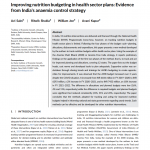
Law schools and pre-legislative debate
13 September 2011
A couple of years ago, during a convocation ceremony at my alma mater, Nalsar University of Law, a National Law University, P. Chidambaram, the then Union finance minister, posed an important question – why were law schools not involved in the debate regarding the interpretation of the Civil Nuclear Liability Bill?
The same question can be asked today of the Lokpal Bill. This question becomes even more pertinent with increased talk of deficit in pre-legislative scrutiny in light of the government’s attitude towards the Jan Lokpal Bill (See Tarunabh Khaitan’s piece on the same). The following question thus arose in my mind – how are law schools informing pre-legislative debate? The question arose during a conversation with a colleague, who I thought made a very valid point about the disconnect between law students and several others watching the debate on the Lokpal. (Though risking a generalization, the arguments made by the former have more to do with the language of the varied drafts and the pragmatism of achieving goals envisaged in the Jan Lokpal draft by way of legislation, in light of previous experiences. The arguments made by the latter centered around the idea of anti-corruption and bribery, and not that much attention was paid to details in the text of the various bills). There is certainly a growing feeling that most of us who spend a fair amount of our time in law school, learning about the nuances of statutory interpretation and the Constitution, are yet to make our presence felt in the debate.
Much has been said about how law school recruitments indicate that lawschools have failed to do what they were set up to do, which is to act as a feeder channel for the bar and the bench and are instead a feeder channel for transactional law firms and corporates. Another oft raised issue is with respect to legal education and the ‘research culture’ of these institutions. While not delving into important questions of how and why this happened, it interests me, as a product of one of these institutions, to examine whether it provides a space, during the course of the undergraduate program, for contribution to public discourse on legislations in the making.
Yes, law students in Nagpur organized a symposium on the Lokpal and presented opinions on the same. Yes, law students participate in the draft legislation analysis competition held by PRS. Alumni from National Law Universities setup the Pre-legislative Briefing Service which has sent comments and research papers to ministries seeking suggestions on legislative drafts, for example, on the Torture Bill and the Civil Nuclear Liability Bill. But how many law students on a regular basis contribute when suggestions are sought by Ministries on draft legislations?
I chose three law schools to examine- 1) Nalsar University of Law, Hyderabad 2) National Law School India University, Bengaluru 3) National University of Juridical Sciences, Kolkata (My sources are three current students of these universities. I’d be more than happy to know more about what’s happening, and alter this table if required)[1]
| Do any of these programmes make curricular space or devote credits to legislative drafting? | Has there been a discussion with regard to any of the versions of the bills on the Lokpal | Are research centres, associated and based out of these law universities involved in assisting with the drafting of legislation ? | |
| NALSAR | Three credits are assigned to a course titled‘Judicial Process and Legislative Drafting’. Typically students opting to pursue the latter, have to draft a statute of their choice in a research paper. | Had a discussion on the Lokpal Drafts on August 21st ( The debate began earlier this year) | Yes. For example, the Centre for Disability Studies associated with Nalsar University has been associated with the working Committee of the Ministry of Social Justice and Environment on the new disability law.
|
| NLSIU | No course of the kind exists | Their ‘Law and Society Group’organizes discussions of similar kind. However, they were yet to initiate a debate on the Lokpal issue, . | Have been part of drafting consultations.[2] |
| NUJS | No course of the kind exists | Not yet. | Have been part of drafting consultations |
What emerges is that only one of these law schools provides for a course in legislative drafting. Secondly, faculty members and research centres are involved in the drafting of other legislations from time to time. With respect to the debate surrounding the Lok Pal Drafts, only one law school had organized a discussion on August 21st ( also very late in the day), and other law schools have not yet done so.
My point is not that law schools must spend more time analyzing the Lokpal Bill, it is that a space must be created in these schools for an informed engagement with legislative drafting. We all agree that an informed debate must ensue. Informed, certainly, by those learning the significance of every punctuation, and conjunction in these legislations-in-the-making.There is a back and forth that should necessarily be part of the exercise of legislative drafting and it is necessary that more actors contribute to this consultative process, and that such contribution is not limited to stray instances listed earlier.
[1] This information dates back to 24th August, 2011.
[2] I’m awaiting information on the same.





